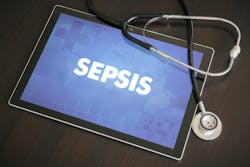New study underscores need for greater objectivity and speed in sepsis diagnosis and triage
Cytovale announced the publication of a new peer-reviewed study that highlights the need for its IntelliSep test. The study, published in "Journal of Personalized Medicine," examined healthcare provider assessments of patients' sepsis risk, which have implications on diagnosis and timely, appropriate care for this fast-moving, potentially deadly condition.
The study also evaluated the impact of improved diagnostic tools, such as host response assays, in the emergency department (ED) to aid in the rapid diagnosis and risk stratification of those with suspected sepsis.
In the modified Delphi study, 26 sepsis experts from multiple specialties, including emergency medicine, critical care, laboratory medicine, infectious disease and pharmacy, were asked to evaluate sepsis risk based on common case presentations. The results showed little agreement, with provider assessment of sepsis risk varying from 10% to 90% for the same case presentations.
These diverging opinions underscored the current challenges with identifying and delivering timely treatment for potentially septic patients and the need for greater objectivity to achieve better outcomes. About 80% of sepsis patients present to the ED, therefore there is a need for improved diagnostic tools, such as host response assays. These tools can aid in patient risk stratification and, when implemented in a protocolized fashion, address the variability among providers in identifying sepsis.
Study participants also were asked to consider results from a rapid diagnostic tool, such as the IntelliSep host response test, which provides insights into the potential risk of sepsis based on standard blood draws in the ED. They indicated that for "borderline" patients, the additional information from this test would either validate their treatment plan or change their approach. For example, if test results indicated:
- A low probability of sepsis, providers said they would give additional consideration to alternative diagnoses.
- A high probability of sepsis, providers said they would immediately initiate aggressive sepsis-focused care.

